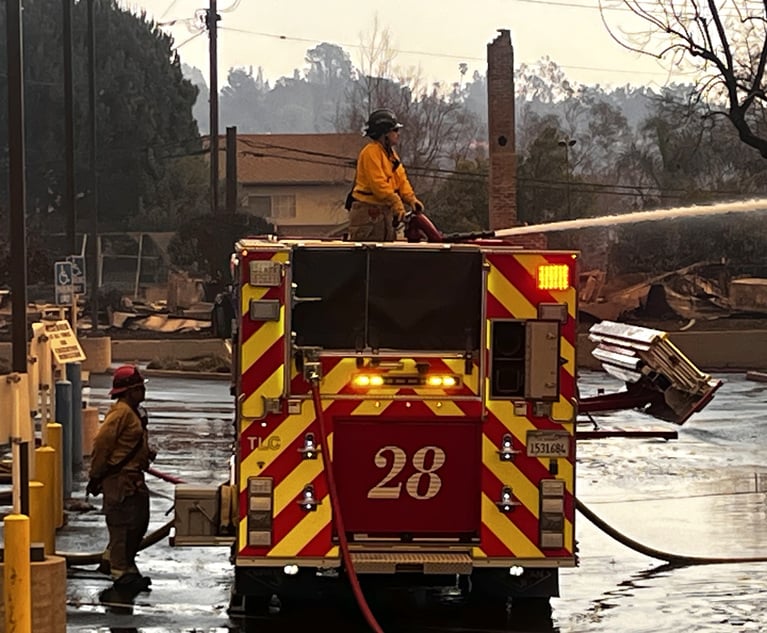1st Georgia Case Over Cancer Links to Baby Powder Opens in Fulton County
Fulton County State Court Judge Jane Morrison is presiding over a wrongful death case against Johnson & Johnson on claims that decadelong use of its talcum baby powder by Diane Brower led to her 2016 death from ovarian cancer.
September 10, 2019 at 02:31 PM
6 minute read
 (Photo: MailHamdi/Shutterstock.com)
(Photo: MailHamdi/Shutterstock.com)
The first Georgia trial over whether Johnson & Johnson's talc-based baby powder causes ovarian cancer opened Tuesday as jury selection began in a Fulton County courtroom.
Fulton County State Court Judge Jane Morrison is presiding over the case, brought on behalf of the 12-year-old granddaughter of Atlanta-area resident Diane Brower.
Brower, who had adopted her granddaughter when the child was 9, died of ovarian cancer in 2016 when she was 65. The lawsuit claims she began using baby powder in 1963 after seeing it advertised in a teen magazine when she was 12 and continued to use the product twice daily for more than two decades. She was diagnosed with Stage III ovarian cancer in 2013.
Brower sued Johnson & Johnson and its major talc supplier, Imerys Talc America, shortly before she died, said Ted Meadows, a partner at Beasley Allen in Birmingham and co-lead attorney in the case. "She, like many women, started using baby powder as a child. What we see in most of our clients is that they were taught by their mothers … to use baby powder for feminine hygiene," Meadows said.
In pretrial hearings, Morrison rejected Johnson & Johnson's efforts to exclude testimony from three medical experts about the links between baby powder and ovarian cancer. The experts include a board-certified pharmacologist, toxicologist and regulatory experts; a Harvard University pathology professor; and the director of gynecologic oncology research at Holy Cross Hospital in Maryland.
The suit seeks unspecified damages, including punitive damages on claims that include wrongful death, product liability, negligence, a failure to warn, fraudulent civil conspiracy and fraudulently misrepresenting the use of baby powder as "safe and effective."
Imerys, which lists its principal place of business as Roswell, Georgia, filed for bankruptcy protection last April and, while Johnson & Johnson faces trial, civil actions against Imerys are stayed, Meadows said.
Jack Dodson of Nashville's Dickinson Wright, Alexander Denton of Atlanta's The Robbins Firm, and Allen Smith of The Smith Law Firm in Mississippi are also counsel on the case.
Ileana Martinez and Leslie Suson at Atlanta's Thompson Hine are Georgia counsel for Johnson & Johnson in the Brower case. Martinez declined to comment.
The Brower trial is the latest in a series of cases around the country against Johnson & Johnson over whether alleged impurities in its baby powder and Shower-to-Shower products resulted in ovarian cancer in thousands of women who used the products for feminine hygiene.
The Brower suit claims that Johnson & Johnson talcum powder products were adulterated with other elements, including asbestos, fibrous talc, silica, and heavy metals that included nickel, cobalt, arsenic, cadmium, mercury, and chromium. The suit also contends that added fragrance also contained carcinogenic chemicals.
Plaintiffs lawyers across the country have maintained that dozens of studies show as much as a 30% increase in ovarian cancer because talc particles could migrate to women's ovaries as a result of genital use and lead to the growth of malignant cells.
An estimated 14,600 lawsuits, including thousands of cases in federal multidistrict litigation in New Jersey, contend that Johnson & Johnson knew for decades that its talcum powder products increased cancer risk in women but withheld that information and, instead, continued to advertise to women to promote hygienic use. Meadows' law partner, Leigh O'Dell, is co-lead counsel in the multidistrict litigation.
The Brower suit claims that in 2006, Imerys supplied Johnson & Johnson with material and safety data sheets warning that "perineal application of baby powder could possibly be linked to ovarian cancer."
Meadows has tried multiple talc-ovarian cancer trials in Missouri and California since 2016. Juries in those cases have collectively awarded ovarian cancer victims and their families more than $5.3 billion in compensatory and punitive damages against Johnson & Johnson.
But in 2017, Los Angeles Superior Court Judge Maren Nelson tossed out a $417 million verdict because of insufficient evidence at trial and "serious misconduct" by the jury, a ruling affirmed by a California appeals court in June.
That same month, a Missouri appeals court also overturned a $72 million talc verdict on jurisdictional grounds because the plaintiff lived in California.
In Georgia, Meadows has six talc cancer cases waiting in the wings in Gwinnett County, at least two on behalf of women who have died. At least four more cases have surfaced in federal court in the Northern and Southern districts of Georgia as Johnson & Johnson has battled to transfer cases out of state courts. It wants to consolidate them in federal bankruptcy court in Delaware, where Imerys is currently in Chapter 11 proceedings.
Meadows said he pursued the litigation in Fulton County state court because he believed the case could be tried more quickly there. "That's important to us because of the nature of the disease," he said. "When the Brower case was originally filed, she was still alive."
Johnson & Johnson twice tried to remove the Brower case to federal court. In 2017, U.S. District Senior Judge Orinda Evans remanded the case to Fulton state court. But after Imerys sought bankruptcy protection last April, Johnson & Johnson attempted a second time to shift the Brower case back to federal court, delaying a scheduled July trial.
Johnson & Johnson lawyers simultaneously attempted to transfer 2,400 pending state court claims to federal courts across the country. In remanding the Brower case to state court a second time, U.S, District Judge Eleanor Ross cited her colleague, U.S. District Judge Leigh Martin May, who had issued a similar remand ruling in several talc-cancer cases pending in her court.
May said Johnson & Johnson had "embarked on a systematic state-wide campaign to remove all state court claims pending against them to the federal district courts where the state court actions were pending, including some that were on the eve of a specially set trial."
"It is clear J&J is trying to consolidate and warehouse over 2,400 state court cases from around the country in the District of Delaware under the thin pretext that the claims against J&J are 'related to' the Chapter 11 reorganization bankruptcy of Imerys Talc America, Inc. (J&J's talc supplier), pending in Wilmington, Delaware," May wrote.
"The Georgia courts where these actions began and have been litigated to date are best suited to resolve these disputes against all parties concerned," May added.
This content has been archived. It is available through our partners, LexisNexis® and Bloomberg Law.
To view this content, please continue to their sites.
Not a Lexis Subscriber?
Subscribe Now
Not a Bloomberg Law Subscriber?
Subscribe Now
NOT FOR REPRINT
© 2025 ALM Global, LLC, All Rights Reserved. Request academic re-use from www.copyright.com. All other uses, submit a request to [email protected]. For more information visit Asset & Logo Licensing.
You Might Like
View All
Veteran Litigators Move From Sidley Austin to Alston & Bird's New Chicago Office
3 minute read
'Pushed Into Oncoming Traffic': $5.85M Settlement in Mediated Auto Tort
6 minute read
Justice Known for Asking 'Tough Questions' Resolves to Improve Civility
4 minute read
'Nerve-Wracking': Fires Disrupting but Not Halting Work of Distributed Firms' LA Lawyers
3 minute readTrending Stories
Who Got The Work
J. Brugh Lower of Gibbons has entered an appearance for industrial equipment supplier Devco Corporation in a pending trademark infringement lawsuit. The suit, accusing the defendant of selling knock-off Graco products, was filed Dec. 18 in New Jersey District Court by Rivkin Radler on behalf of Graco Inc. and Graco Minnesota. The case, assigned to U.S. District Judge Zahid N. Quraishi, is 3:24-cv-11294, Graco Inc. et al v. Devco Corporation.
Who Got The Work
Rebecca Maller-Stein and Kent A. Yalowitz of Arnold & Porter Kaye Scholer have entered their appearances for Hanaco Venture Capital and its executives, Lior Prosor and David Frankel, in a pending securities lawsuit. The action, filed on Dec. 24 in New York Southern District Court by Zell, Aron & Co. on behalf of Goldeneye Advisors, accuses the defendants of negligently and fraudulently managing the plaintiff's $1 million investment. The case, assigned to U.S. District Judge Vernon S. Broderick, is 1:24-cv-09918, Goldeneye Advisors, LLC v. Hanaco Venture Capital, Ltd. et al.
Who Got The Work
Attorneys from A&O Shearman has stepped in as defense counsel for Toronto-Dominion Bank and other defendants in a pending securities class action. The suit, filed Dec. 11 in New York Southern District Court by Bleichmar Fonti & Auld, accuses the defendants of concealing the bank's 'pervasive' deficiencies in regards to its compliance with the Bank Secrecy Act and the quality of its anti-money laundering controls. The case, assigned to U.S. District Judge Arun Subramanian, is 1:24-cv-09445, Gonzalez v. The Toronto-Dominion Bank et al.
Who Got The Work
Crown Castle International, a Pennsylvania company providing shared communications infrastructure, has turned to Luke D. Wolf of Gordon Rees Scully Mansukhani to fend off a pending breach-of-contract lawsuit. The court action, filed Nov. 25 in Michigan Eastern District Court by Hooper Hathaway PC on behalf of The Town Residences LLC, accuses Crown Castle of failing to transfer approximately $30,000 in utility payments from T-Mobile in breach of a roof-top lease and assignment agreement. The case, assigned to U.S. District Judge Susan K. Declercq, is 2:24-cv-13131, The Town Residences LLC v. T-Mobile US, Inc. et al.
Who Got The Work
Wilfred P. Coronato and Daniel M. Schwartz of McCarter & English have stepped in as defense counsel to Electrolux Home Products Inc. in a pending product liability lawsuit. The court action, filed Nov. 26 in New York Eastern District Court by Poulos Lopiccolo PC and Nagel Rice LLP on behalf of David Stern, alleges that the defendant's refrigerators’ drawers and shelving repeatedly break and fall apart within months after purchase. The case, assigned to U.S. District Judge Joan M. Azrack, is 2:24-cv-08204, Stern v. Electrolux Home Products, Inc.
Featured Firms
Law Offices of Gary Martin Hays & Associates, P.C.
(470) 294-1674
Law Offices of Mark E. Salomone
(857) 444-6468
Smith & Hassler
(713) 739-1250






